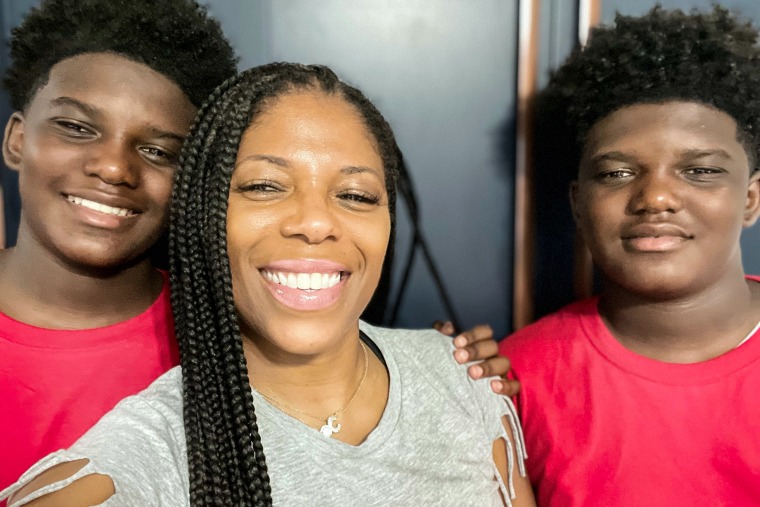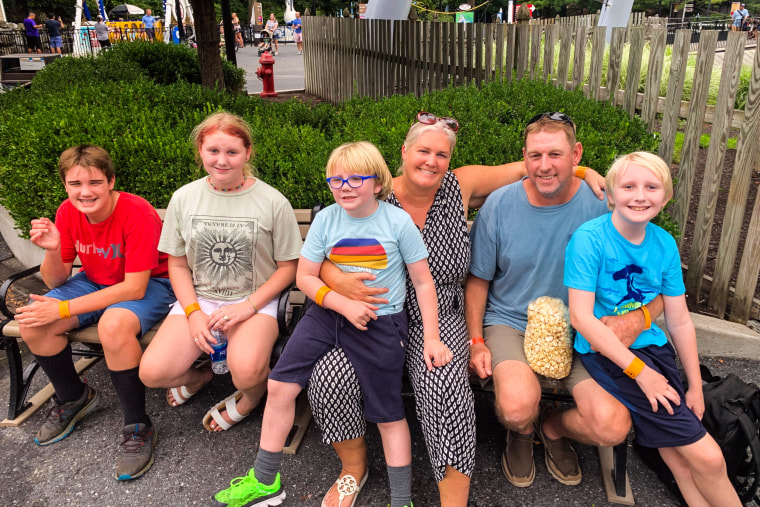Parents aren’t just anxious about sending their children back to school as the delta variant rages.
They’re so worried about their kids’ health and the safety of their communities that many parents — especially Black and Hispanic parents — now say they’d rather keep them home learning remotely, at least part time, new research finds.
“It’s not just that parents aren’t OK,” said Adam Burns, a partner at Edge Research, who led the nationwide parent survey released Wednesday from the National Parent Teacher Association.
“They’ve been not-OK for about 18 months.”
Many parents believed in the spring that the worst of the Covid-19 pandemic was behind them, hoping that widely available vaccines would mean no longer having to contend with the technical glitches, academic struggles and emotional challenges of online instruction.
Then, on July 27, the Centers for Disease Control and Prevention updated its health guidance in response to the more contagious delta variant, urging vaccinated people to resume precautions such as wearing masks.
For parents, the news about the delta variant was “another hit to the gut,” Burns said.
The survey, which was funded by the CDC through the Atlanta-based nonprofit CDC Foundation and polled a sample of 1,448 public school parents and guardians from July 23 to Aug. 8, captured the spike in their concerns after the CDC updated its guidance.
Before July 27, 58 percent of those surveyed said they wanted their children in a classroom full time this year.
Afterward, that figure dropped to 43 percent.
“It’s a huge concern,” said Kizzy Dogan, a mother in Washington, D.C., whose 12-year-old twin sons struggled with online classes last year.
“Even though I’m like, ‘Oh, my God, yes, take them back to the building to get them out the house,’ in all actuality, it is a fear,” she said, noting that last week, just days before her sons were due to start in-person classes, she was informed that someone who had been in the school had tested positive for Covid. Her sons’ school is only offering an online option to children with medical needs, so her boys aren't eligible.

“It’s like a Catch-22,” she said. “You want them back in the building, but at the same time, you want them safe. You want them healthy. You want them home so if staying home is the best way, then I think we need to stay at home.”
Black parents like Dogan were less likely to want their children to be in a classroom, with just 41 percent saying after July 27 that they wanted a full-time in-person program, the survey found. For Hispanic parents, that figure fell to 37 percent.
Black and Hispanic parents expressed a preference for online programs despite the fact that they’re more likely to have essential worker jobs that can’t be done remotely and are more likely to rely on in-person school so they can work, said Chris Mathias, a senior affiliate at HCM Strategists, who interviewed parents in focus groups as part of the survey.
Many Black and Hispanic parents did not have a great experience with online instruction last year and were more likely to experience internet or connection issues.
Yet in the survey and focus groups, they were more likely to say students and parents need to sacrifice in-person instruction to keep their families and communities safe.
They’re “begrudgingly going back to school and really don’t want to be,” Mathias said. “They wish there were more online options — quality online options.”
‘On a roller coaster’
Parents’ increasing demand for remote instruction has triggered a scramble among school districts.
At the end of July, just 41 of the nation's 100 largest school districts were planning to offer a remote learning option in the new academic year, according to the University of Washington’s Center on Reinventing Public Education, which tracks school Covid responses.
By this week, that figure had more than doubled to 92 districts, though only 56 of them were making online programs available to all students.
“We heard from parents loud and clear,” said Michael Hinojosa, superintendent of the Dallas Independent School District, which launched a temporary virtual academy Aug. 24 for students younger than 12, who are not yet eligible for the Covid vaccine.
In the weeks since Dallas and many other districts in the South began the school year in early August, Covid rates and deaths have spiked across the country. Many schools that started the school year last month have been forced to close down or quarantine large numbers of students and teachers.
“It’s like we’re on a roller coaster,” Hinojosa said. “Just when we thought we might have some normalcy this year, everybody was excited about back-to-school, and it all changed. It pivoted on a dime.”
The politics around Covid safety measures have only made things more difficult. Protesters have swarmed school boards and health departments around the country, waging increasingly nasty battles over mask and vaccine mandates.
The tension has undermined parents’ confidence in school safety — and in one another.
The National PTA and the CDC Foundation survey found that a majority of parents — 75 percent — consider mask use by all students, teachers and staff, regardless of their vaccination status, to be the most important or a very important measure that schools can take to reduce health risks, but many schools are not mandating masks.
Some states have barred mask mandates. Others have prohibited online instruction.
The survey also found that 1 in 4 parents — disproportionately men, people with high incomes and people whose children are vaccinated — said they would definitely or probably send their children to school with mild cold symptoms that could be Covid-19.
In Texas, Dallas is among districts fighting to continue requiring masks despite an order from Gov. Greg Abbott, a Republican, barring these mandates.
The Dallas district also made the decision to offer the virtual program despite the fact that Texas currently won't fund it. Nearly 2,000 students have opted in so far, which will cost the district $20 million, Hinojosa said; if more make that choice, the cost will rise.
It’s worth the expense, he said. Though he believes most students need the attention from teachers that comes from in-person instruction, he didn’t want parents to keep their children out of school altogether.
“Our kids have really fallen far behind, but we’d rather have them here than not have them at all,” he said.
‘It’s starting all over again’
Parents have been making impossible choices since the pandemic began, weighing health concerns against children’s academic and emotional needs.
But the whiplash of these last few weeks has been particularly difficult, said Liz Parlett-Butcher, a mother of four from Egg Harbor Township, New Jersey, who participated in one of the parent focus groups.
“It’s like ‘Groundhog Day,’” she said. “You feel like you’re waking up and it’s starting all over again.”

Parlett-Butcher’s youngest child, who has autism and dyslexia, fell so far behind last year with limited in-person instruction that she and her husband decided to hold him back to repeat first grade.
She’s counting on him being able to go back to school full time but worries the virus will shutter school again.
“I see some signs on the wall and I’m fearful,” she said.
Another parent, Mary Cotofan, a mother of two from North Olmsted, Ohio, wishes her district offered an online option.
She worries that her children, who at 8 and 11 are too young to be vaccinated, could get sick and come down with “long haul” Covid symptoms. She also worries they could infect her father or prevent her from seeing him regularly.
“I feel like we’re entering a much riskier time in terms of kids than we have the whole pandemic,” she said. “And we’re just sending them all back in together and hoping for the best.”